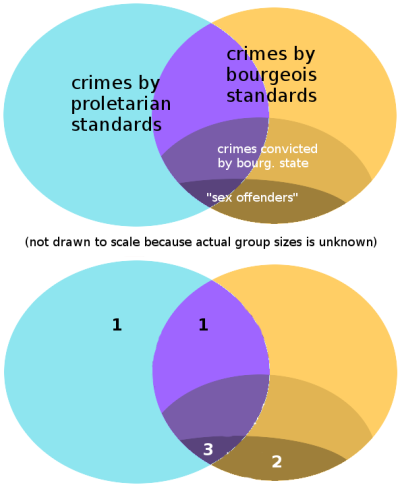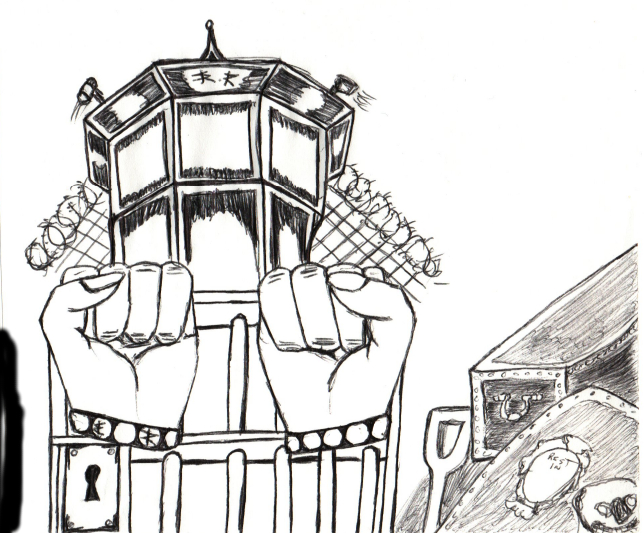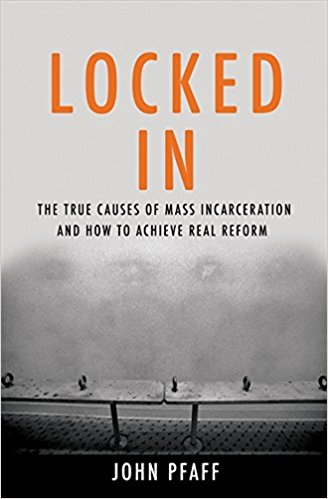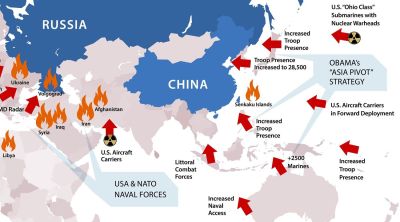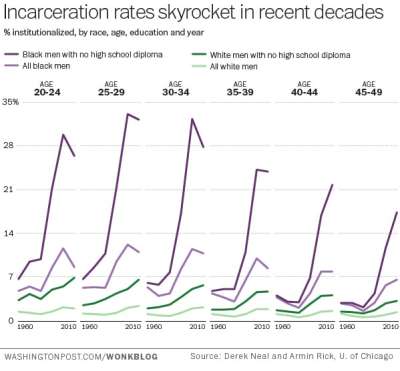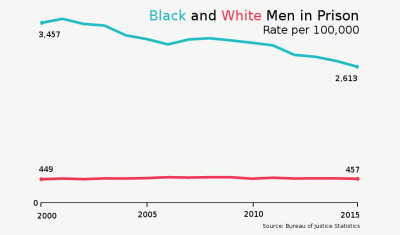
2018 Survey of U.S. Prisoners on Prison Labor
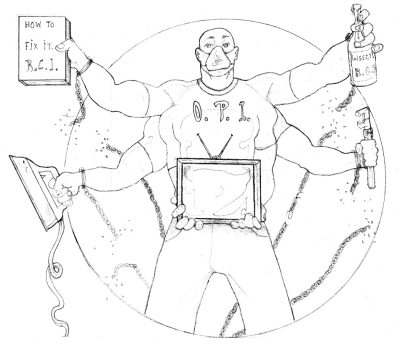
The Western press often aims the disparaging term “labor camps” at Asia and the former socialist countries of the world. Yet, with the largest prison population in the world, it should not be surprising that it is the Amerikans who have more prisoners working for them than any other nation. And their labor subsidizes the cost for Amerikans to maintain a highly structured and institutionalized system of national oppression in this country.
While prisons do “cost” taxpayers money, Amerikans benefit directly, indirectly and psychologically from the criminal injustice system. There is a lot of money being made off the system, not by exploiting prisoner labor, but in the form of public employee salaries. In Pennsylvania, for instance, prison guards are among the state’s highest paid employees.(1) And in many states these jobs are so important, the guard unions will successfully fight against any prison closures, even when there aren’t enough prisoners to fill the cells. Meanwhile, prisoners are doing much of the maintenance work in these institutions, for little or no pay. In the vast majority of U.$. prisons, the state would need to hire more people if they couldn’t use prisoners to help with prison operations.
In this article we will look at the relationship between prisoner labor and the cost of running prisons. Our goal is to understand what work prisoners are doing, what they are being paid, what the impact of that work is, and how battles around prisoner labor can be a progressive part of the fight against the imperialist criminal injustice system.
This winter MIM(Prisons) conducted a survey of ULK readers regarding prison labor, in part in response to many organizations’ recent focus on this topic. The results are what we believe to be the most comprehensive dataset on prison labor in the United $tates.
In our 2009 issue on this topic, we reported on prison labor in 11 states and the Federal system, representing over half the country’s prison population. In 2018, we received reports from 20 state systems and the Federal Bureau of Prisons. This survey far exceeds our 2009 survey in content and consistency. This article will present our preliminary results, with the full report to come in a later, more in-depth publication on the economics of the U.$. prison system.
How many prisoners have jobs?
Overall, 44% of prisoners have a job assignment, which includes school and other programming in some states. This varied greatly between prisons, from less than 1% to a maximum of 100% where working is mandatory. Of those who do work, most are engaged in work related to maintaining the prison itself.
What do prisoners do?
The chart below shows results from our survey showing at least 63% of prisoners engaged in prison maintenance. There is a significant “Other” category that may or may not fall into prison maintenance. While our survey results so far show 25% of prisoners working in agriculture or industry, this does not correspond with other information available. UNICOR, the state-run industries for the Federal Bureau of Prisons (BOP), accounts for less than 7% of those held by the BOP. Yet UNICOR is the biggest user of prisoners in the country, with half the revenue of all other state-run industries combined.
While our results confirmed a majority working in maintenance of prisons, we believe this to be greatly underestimated and will work to refine our figures. Meanwhile the three biggest prison states only use 2-6% of their prison population in their state-run industries.
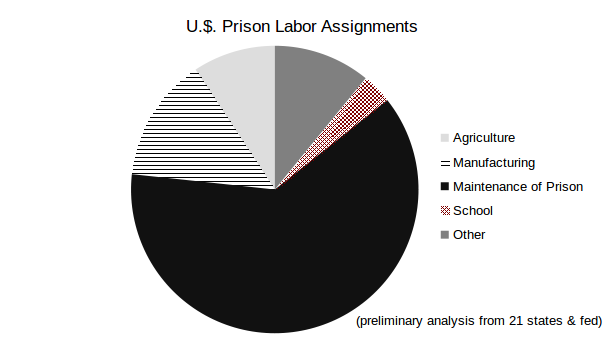
How much are prisoners paid?
Working prisoners mostly fall into two categories: prison maintenance and state-owned industries. The latter generally offers higher wages. Below are averages for all U.$. prisons from a Prison Policy Initiative survey of state agencies(2):
| maintenance | industries | ||
|---|---|---|---|
| low | high | low | high |
| 0.14 | 0.63 | 0.33 | 1.41 |
Our statistical analysis of low and high wages by state matched up quite closely with the Prison Policy Initiative survey, with many states being right on. This helped us confirm the numbers reported by our readers, and substantiates the Prison Policy Initiative data set, which covers every state and comes from state sources.
From our data we can say that almost half of prisoners who work in the United $tates make $0.00. Generally in lieu of pay, 43% of jobs in our survey offer credits of some sort (usually promising time off their sentence). Though states like Texas are notorious for these credits being meaningless or not applied. About 11% of prisoners who work do so for neither pay nor even the promise of credits, according to our preliminary results.
Who do prisoners work for?
The state.
The portion of prisoners working for private industries is very small. We’ve long been frustrated with the outdated, self-referential, or complete lack of citations used by most when writing about private companies using prison labor.(3) Our initial results only returned 4.3% of prison jobs being attributed to a private company, and of those who produce a product, 1.8% being sold to private companies. While we will continue to tally and interpret our results, these are in the ball park of what we can infer from a literature search of what is going on in prisons across the United $tates.
As John Pfaff pointed out in eir book Locked In, “Public revenue and public-sector union lobbying are far more important [financial and political engines behind prison growth].” These state prison industries are becoming sources of revenue for state budgets. This could be worse than private corporations lobbying for more imprisonment. It’s the very state that decides policy that is directly benefiting financially.
A U.$. Proletariat?
Of all the so-called “workers” in the United $tates, prisoners, along with non-citizen migrants, are some of the only people who face working conditions comparable to the Third World. OSHA has no real ability to enforce in prisons, and in some cases prisoners do hazardous jobs like recycling electronics or the tough field work, that many migrants perform. A recent expose of a “Christian Alcoholics & Addicts in Recovery (CAAIR)” program in Oklahoma documented that prisoners were promised drug treatment but when they joined the program were forced to work in chicken processing plants. The prisoners suffered gnarled hands, acid burns, injuries from machines and serious bacterial infections.(4) While this is only a tiny minority of prisoners, the fact that they are susceptible to such conditions does speak to the closeness this class of people is to the Third World proletariat.
While at first glance the pay rates above clearly put U.$. prisoners with full time jobs in the exploited classes, we must consider that by default prisoners’ material needs are covered by the state. However, there are still some basic needs that are not covered in many prisons. Many prisoners face conditions with insufficient food, exorbitant co-pays for medical care, and a requirement to purchase hygiene items, educational materials and other basic necessities. And for the lumpen who don’t have money in the bank or families who can cover these needs, pay for work in prison is essential.
Labor Subsidizes State Budgets
But even where prisoners are expected to pay for these basic necessities and are not paid enough to cover the costs, we don’t find net profit for the state. In spite of prisoners’ work, facilities are still run at a huge financial loss to the state, and profits from prisoner labor are going to subsize the state budget. Sure lots of individual guards and other prison staff are making good money, and corporations are also cashing in by selling products to the prison and to prisoners. But none of this is coming from prisoner labor. Prisoner labor is just helping to cut the costs a bit for the state. Below we lay out our calculations on this question.Ultimately, we’re talking about a criminal injustice system that costs $80 billion a year. There are profits from the 4.3% of prisoners who work for private industries. But most of the revenue comes from state-run prison industries. These state-run industries bring in a revenue of $1.5 billion a year.(5) At a generous profit rate of 10%, that would be $150 million in net gain, or 0.2% of costs. Because so many prisoners aren’t paid or are paid very low wages we could even double that profit rate and still have a very small gain relative to the cost of prisons.
Another way to look at this calculation is to consider the costs to house one prisoner compared to the potential revenue they generate when working full time. It costs about $29k/yr to house a Federal prisoner. If these prisoners are leased out to private companies for $10/hr and the state keeps all the money, the state only makes about $20k, still losing money on the deal. Obviously, when the state undercharges for labor, private companies can make a profit. But that profit is subsidized by the state, which has to pay for prisoners housing and food, with the greatest expense being in how to actually keep people locked inside.
We can also calculate savings to the state from prisoner labor using our survey numbers. We chose $10 per hour below as a rough compromise between the Federal minimum wage, and a typical CO’s hourly wage. In reality, no U.$. citizen would work maintaining prisons for minimum wage. And a negligible number of COs would bring themselves to do something “for” prisoners, such as cleaning their showers. If non-prisoners were needed to maintain prison facilities, we suspect only migrant workers would be up for this task.
Another consideration is that jobs in prison are mostly used to keep people busy (i.e. keep people not reading, and not organizing). If paying “freeworld” people to do these jobs, they would certainly hire many fewer employees than they have prisoners doing the same tasks.
These calculations are primarily to demonstrate magnitude, not actual budget projections.
62% of 800 thousand prisoners (percentage with state-run jobs) = 496
thousand prisoner workers
150 hours/mo work on average * 12 months of work = 1,800 hours of
work
So we estimate that hiring non-prisoners to do the work that prisoners do would cost about $8.9 billion, which adds up to an additional 10% of the overall costs of running prisons. That’s a sizeable increase in costs, but prisons are still far from profitable. We can add the two numbers above together to estimate the total earnings + savings to the state from using prisoner labor. That total is still less than $10 billion. Bottom line: the state is still losing $80 billion a year, they’re just saving at most $9 billion by having prisoners work and earning back another $150 million or so of that $80 billion, through exploitation.
Those arguing that a massive prison labor strike will shut down the prisons may be correct in the short term, to the extent that some prisons which rely heavily on prison labor will not be able to immediately respond. But that certainly doesn’t mean prisoners being released. More likely it means a complete lockdown and round the clock johnnies. And historically states have been quite willing to pour money into the criminal injustice system, so a 10% increase in costs is not that far-fetched. On the other hand, states are even more willing to cut services to prisoners to save money. So the requirement to hire outside staff instead of using prisoner labor could just as likely lead to even further cuts in services to prisoners.
History of Prison Labor in U.$.
In 1880, more than 10,000 New Afrikans worked in mines, fields and work camps as part of the convict lease system in the South. This was shortly after the creation of the 13th Amendment, and eased the transition for many industries which made use of this prison labor. In the North prison industries were experimented with around this time, but imprisonment costs prevented them from being profitable. And in response labor unions began opposing the use of prison labor more and more. By the Great Depression, opposition was stronger and the government banned the use of prison labor for public works projects.(5)
In 1934, the Federal Prison Industries, or UNICOR, was formed as a way to utilize prison labor for rehabilitation and state interests without competing with private industry. This protection for private industry was ensured with strict restrictions on UNICOR including limiting them to selling only to the states. This has maintained the primary form of what might be considered productive labor in U.$. prisons. UNICOR does function as a corporation aiming to increase profits, despite its tight relationship to the state. While state agencies used to have to buy from UNICOR, this is no longer the case, making it fit better into Marx’s definition of productive labor. Those running the prisons for the state, whether public employees or prisoners preparing meals, would not fall into what Marx called productive labor because neither are employed by capital.
Starting in the 1970s, there has been legislation to loosen restrictions on prison labor use by private industry.(5) (see Alaska House Bill 171 this year) However, we could not find in our research or our survey any substantiation to claims of a vast, or growing, private employment of prisoners in the United $tates.
The Future of Prison Labor
The key to all of these battles is keeping a focus on the national liberation struggles that must be at the forefront of any revolutionary movement today. There are Amerikan labor organizers who would like to use the prisoner labor movement to demand even higher wages for the labor aristocracy. These organizers don’t want low-paid prisoners to replace high-paid petty bourgeois workers. This might seem like a great opportunity for an alliance, but the interests of the labor aristocracy is very much counter to national liberation. They are the mass base behind the prison craze. They would be happy to see prisoners rot in their cells. It’s not higher pay for prisoners that they want, it’s higher pay for their class that the labor aristocracy wants. On the other hand, the prison movement is intricately tied up in the anti-colonial battle, by the very nature of prisons. And to move the needle towards real progress for humynity, we must reinforce this tie in all of our work. This means we can’t allow the labor aristocracy to co-opt battles for prisoner workers’ rights and wages.
While U.$. caselaw does not recognize prisoners as employees, there continue to be new lawsuits and arguments being made to challenge prison labor in various ways.(6) We see these challenges to certain aspects of the law on unpaid labor as reformist battles, unlikely to have much bearing on the future of the prison movement. It is unlikely the courts will see prison maintenance as labor requiring minimum wage protection. So if changes are made in the law, we expect them to be very marginal in scope, or to actually encourage more private employment. In contrast, the mass mobilizations that have focused on pay, among other issues, are advancing the struggle for prisoner humyn rights by organizing the masses in collective action.(7)
While half of prisoners work in some form, about half of them aren’t paid. And this is because an income from work is not a condition of survival when food, clothes and shelter are provided by the state. However, we have noticed a trend (at least anecdotally) towards charging people for different aspects of their own incarceration. The narrowly-focused movement to amend the 13th Amendment could have the consequence of expanding such charges, and actually making it affordable for the state to imprison more people because they are paying for their own needs. While we concluded in ULK 60 that there has not been a strong decrease in imprisonment in response to the 2008 financial crisis, the rates have certainly stagnated, indicating that we may be bumping up against financial limitations.(8) A scenario like the above could undermine these financial limitations, unless they are accompanied by laws prohibiting the garnishing of prisoner wages.
The delinking of Third World countries from the U.$. empire will create more economic crisis as wealth flow from those countries to this one will decrease. This would create more incentive for forced labor in prisons that is productive, providing value for the rest of Amerikans. This is what occurred in Nazi Germany, and could occur in a future fascist scenario here. While we can definitively say the last prison surge was not driven by profits, that doesn’t mean it couldn’t happen. And if it did, it would be a very dangerous thing. On that we agree with the mass sentiment opposed to prison labor. But to date, in this country, it’s been more expedient to exploit value from elsewhere. Even the convict leasing of the late 1800s was the vestiges of an out-dated system of exploitation that was eventually abandoned.
Very few prisoners in the United $tates are close to the means of production. Therefore it is not the role of the prison movement to seize the means of production, as it is for the proletariat. It is our role to build independent institutions of the oppressed. And this has often meant seizing institutions like churches, schools and even prisons in the examples of Attica and Walpole. Ultimately, such acts must build support for larger movements for national liberation. Prisoners have an important role to play in these movements because they are one of the most oppressed segments of the internal semi-colonies. But they cannot achieve liberation alone.
Related Articles:This article referenced in:








